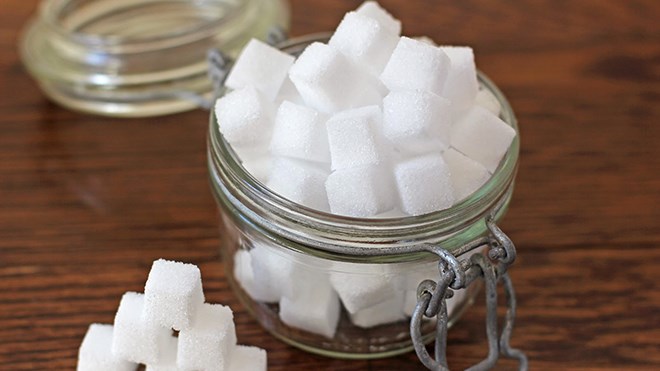Artists from The Archies to Def Leppard have sung about it.
Throughout history, it has influenced colonization, economies and wars. In modern life, it has found its way into grocery stores, restaurants, gas stations, pharmacies and is available to us at just about every waking moment. Sugar not only provides us with energy—it’s cheap, sweet and legal.
Its appeal has led to overconsumption which has prompted the Heart & Stroke Foundation to release a position statement on sugar that echoes the recommendations of the World Health Organization. They have recommended that Canadians decrease their consumption of added sugar to no more than 10 percent of their total daily calories.
For an average 2000 calorie diet, 10% is about 50 grams of sugar. With all the hype, you might be asking yourself: What’s so bad about sugar? Where does sugar fit in a balanced diet? Or How can I decrease my intake?
Eating sugar provides us with energy and it’s our brain’s main source of fuel. However, we can have too much of a good thing. Excessive intake of sugar is associated with heart disease, stroke, obesity, diabetes, high blood cholesterol, cancer and cavities. Sugar itself may be cheap but treating these health conditions certainly isn’t.
As you’ve heard many times before, the keys here are balance and moderation.
What do I mean by balance? I like to compare sugar consumption to your household budget. With your income you have to meet your basic needs first: shelter, food, clothing, medicine. If there is money left over, you might afford cable TV, a cell phone or a car.
Once in a while, you might enjoy a concert or a vacation. The same is true for sugar. With your sugar allowance you have to meet your basic needs first: fruit, milk, vegetables, whole grains, legumes. If there is room in your sugar budget, you might afford some extras like a can of pop on movie night, maple syrup on Saturday morning pancakes or honey in your tea.
Once in a while, you can enjoy cake for a birthday or dessert on an anniversary. Whether we’re talking about money or sugar, failing to balance our budget can get us into serious trouble.
Beverage
Sugar
Sports drink (500mL bottle)
30g
Orange juice (250mL)
23g
Energy drink (250mL can)
28g
Iced coffee with milk (360mL)
36g
Coffee, 2 cream, 2 sugar (591mL)
30g
Cola (355mL can)
41g
One of the most effective ways to decrease your added sugar intake is by avoiding sugar-sweetened beverages like soft drinks, sports drinks, juices, energy drinks and specialty coffees. These are the biggest contributor of sugar to our diet. Instead, drink water or milk. Add citrus fruits or berries to your water to infuse it with flavor.
At breakfast, choose foods that contain fiber and protein instead of high-sugar cereals. Enjoy a poached egg and sliced tomato on a whole grain English muffin with a glass of milk instead of cereals that contain chocolate, marshmallows, honey or brown sugar.
When buying breakfast cereals, choose those that contain more fiber and 6g of sugar or less per 30g serving.
For snacks, choose less-processed foods like nuts, seeds, veggies, fruit, or plain yogurt instead of packaged snacks like granola bars, cookies or fruit snacks. Read ingredient lists on packaged foods and be aware that brown sugar, maple syrup, glucose, fructose, sucrose, honey, evaporated cane juice, fruit puree, molasses, corn syrup, concentrated fruit juice, and dextrose all mean sugar! Some sugars may hide behind the disguise of ‘natural’ but don’t be fooled—if they aren’t intrinsic to the food they are still added sugars.
Choose foods with fewer ingredients and prepare more meals at home to help reduce your sugar intake.
This may be a very radical change in thinking for a lot of people but change is good.
Sugar is everywhere the way that tobacco used to be. People smoked on air planes, in restaurants and even doctor’s offices. We’ve certainly changed our policies on that! I’m sure change won’t happen overnight and these recommendations and subsequent changes in policy may be met with some resistance. I’m confident, though, that a world with less sugar can still be pretty sweet!
If you have questions about added sugars or other nutrition topics, please visit www.eatrightontario.ca or call 1-877-510-5102 to speak to a Registered Dietitian.
